Pearson BTEC HND in Business Unit 9: Entrepreneurship Report
VerifiedAdded on 2023/01/18
|17
|4678
|73
Report
AI Summary
This report provides a comprehensive overview of entrepreneurship and small business management. It begins with an introduction to entrepreneurship, defining its core principles and the role of entrepreneurs. The report then delves into different types of entrepreneurial ventures, including small businesses, scalable start-ups, large company ventures, and social enterprises, along with the topology of entrepreneurship. It differentiates between large and small entrepreneurial ventures, as well as social and scalable start-up ventures. The report further examines the impact of SMEs on the economy, highlighting their contributions to employment, GDP, and tax revenue. Additionally, it explores the importance of small businesses and start-ups to the growth of the social economy. The report also details the characteristics, traits, and skills of successful entrepreneurs, along with entrepreneurial motivation and mind-set. Finally, it discusses the background and experiences that foster entrepreneurship, concluding with a summary of the key findings and a list of references. The report covers topics such as venture types, entrepreneurial motivations, and the economic impact of small and medium-sized enterprises (SMEs).

Entrepreneurship
&
Small Business
Management
&
Small Business
Management
Paraphrase This Document
Need a fresh take? Get an instant paraphrase of this document with our AI Paraphraser
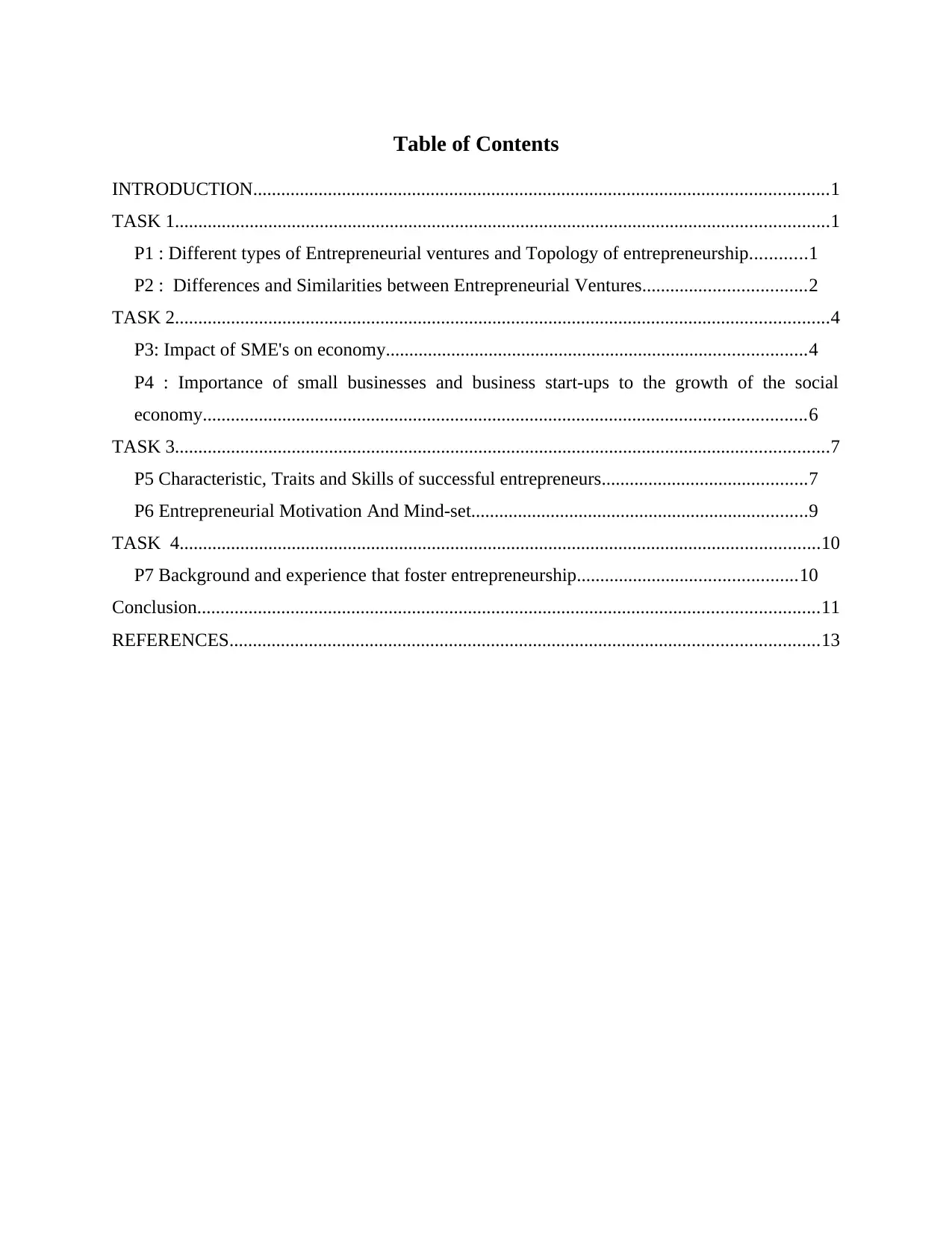
Table of Contents
INTRODUCTION...........................................................................................................................1
TASK 1............................................................................................................................................1
P1 : Different types of Entrepreneurial ventures and Topology of entrepreneurship............1
P2 : Differences and Similarities between Entrepreneurial Ventures...................................2
TASK 2............................................................................................................................................4
P3: Impact of SME's on economy..........................................................................................4
P4 : Importance of small businesses and business start-ups to the growth of the social
economy.................................................................................................................................6
TASK 3............................................................................................................................................7
P5 Characteristic, Traits and Skills of successful entrepreneurs............................................7
P6 Entrepreneurial Motivation And Mind-set........................................................................9
TASK 4.........................................................................................................................................10
P7 Background and experience that foster entrepreneurship...............................................10
Conclusion.....................................................................................................................................11
REFERENCES..............................................................................................................................13
INTRODUCTION...........................................................................................................................1
TASK 1............................................................................................................................................1
P1 : Different types of Entrepreneurial ventures and Topology of entrepreneurship............1
P2 : Differences and Similarities between Entrepreneurial Ventures...................................2
TASK 2............................................................................................................................................4
P3: Impact of SME's on economy..........................................................................................4
P4 : Importance of small businesses and business start-ups to the growth of the social
economy.................................................................................................................................6
TASK 3............................................................................................................................................7
P5 Characteristic, Traits and Skills of successful entrepreneurs............................................7
P6 Entrepreneurial Motivation And Mind-set........................................................................9
TASK 4.........................................................................................................................................10
P7 Background and experience that foster entrepreneurship...............................................10
Conclusion.....................................................................................................................................11
REFERENCES..............................................................................................................................13

⊘ This is a preview!⊘
Do you want full access?
Subscribe today to unlock all pages.

Trusted by 1+ million students worldwide
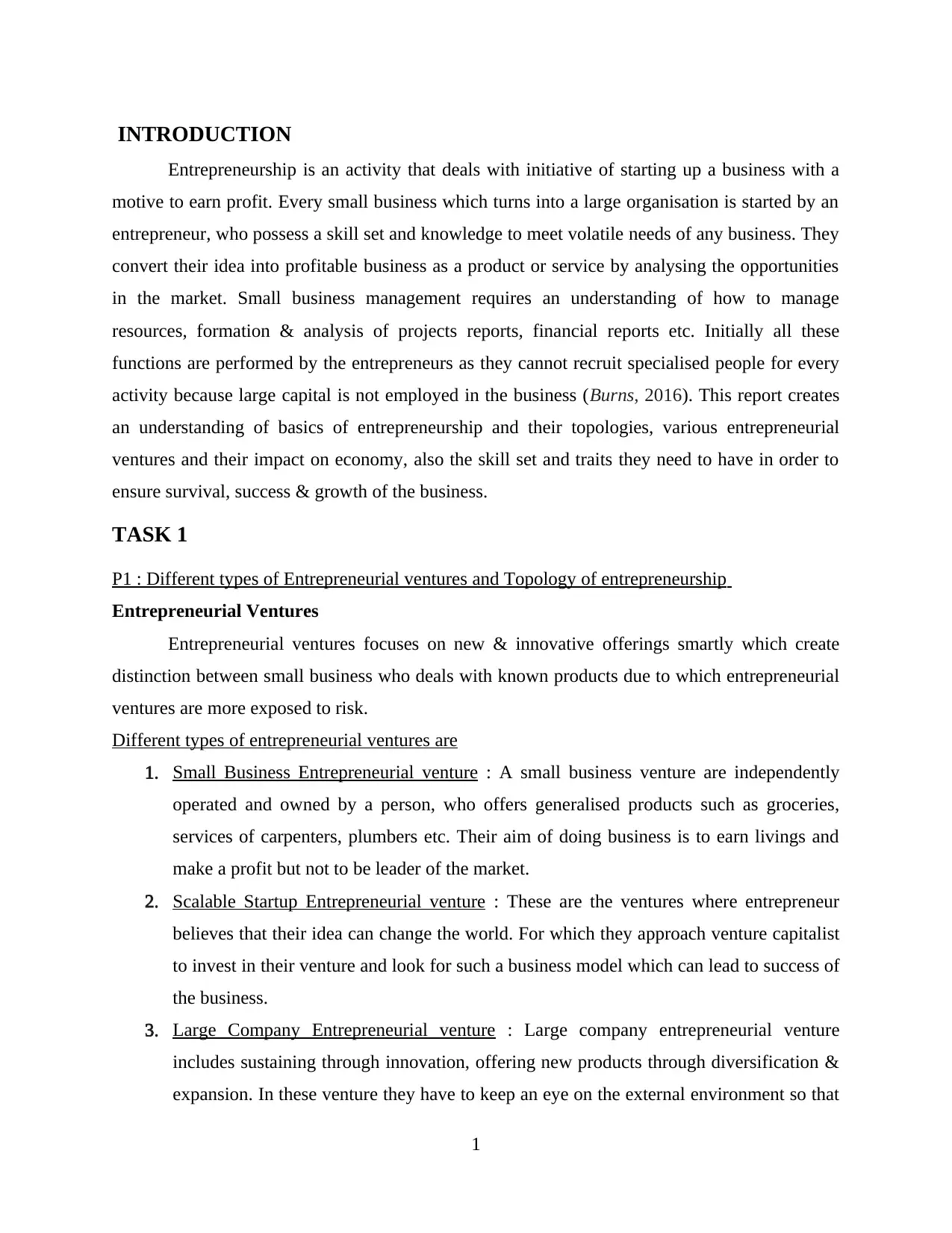
INTRODUCTION
Entrepreneurship is an activity that deals with initiative of starting up a business with a
motive to earn profit. Every small business which turns into a large organisation is started by an
entrepreneur, who possess a skill set and knowledge to meet volatile needs of any business. They
convert their idea into profitable business as a product or service by analysing the opportunities
in the market. Small business management requires an understanding of how to manage
resources, formation & analysis of projects reports, financial reports etc. Initially all these
functions are performed by the entrepreneurs as they cannot recruit specialised people for every
activity because large capital is not employed in the business (Burns, 2016). This report creates
an understanding of basics of entrepreneurship and their topologies, various entrepreneurial
ventures and their impact on economy, also the skill set and traits they need to have in order to
ensure survival, success & growth of the business.
TASK 1
P1 : Different types of Entrepreneurial ventures and Topology of entrepreneurship
Entrepreneurial Ventures
Entrepreneurial ventures focuses on new & innovative offerings smartly which create
distinction between small business who deals with known products due to which entrepreneurial
ventures are more exposed to risk.
Different types of entrepreneurial ventures are
1. Small Business Entrepreneurial venture : A small business venture are independently
operated and owned by a person, who offers generalised products such as groceries,
services of carpenters, plumbers etc. Their aim of doing business is to earn livings and
make a profit but not to be leader of the market.
2. Scalable Startup Entrepreneurial venture : These are the ventures where entrepreneur
believes that their idea can change the world. For which they approach venture capitalist
to invest in their venture and look for such a business model which can lead to success of
the business.
3. Large Company Entrepreneurial venture : Large company entrepreneurial venture
includes sustaining through innovation, offering new products through diversification &
expansion. In these venture they have to keep an eye on the external environment so that
1
Entrepreneurship is an activity that deals with initiative of starting up a business with a
motive to earn profit. Every small business which turns into a large organisation is started by an
entrepreneur, who possess a skill set and knowledge to meet volatile needs of any business. They
convert their idea into profitable business as a product or service by analysing the opportunities
in the market. Small business management requires an understanding of how to manage
resources, formation & analysis of projects reports, financial reports etc. Initially all these
functions are performed by the entrepreneurs as they cannot recruit specialised people for every
activity because large capital is not employed in the business (Burns, 2016). This report creates
an understanding of basics of entrepreneurship and their topologies, various entrepreneurial
ventures and their impact on economy, also the skill set and traits they need to have in order to
ensure survival, success & growth of the business.
TASK 1
P1 : Different types of Entrepreneurial ventures and Topology of entrepreneurship
Entrepreneurial Ventures
Entrepreneurial ventures focuses on new & innovative offerings smartly which create
distinction between small business who deals with known products due to which entrepreneurial
ventures are more exposed to risk.
Different types of entrepreneurial ventures are
1. Small Business Entrepreneurial venture : A small business venture are independently
operated and owned by a person, who offers generalised products such as groceries,
services of carpenters, plumbers etc. Their aim of doing business is to earn livings and
make a profit but not to be leader of the market.
2. Scalable Startup Entrepreneurial venture : These are the ventures where entrepreneur
believes that their idea can change the world. For which they approach venture capitalist
to invest in their venture and look for such a business model which can lead to success of
the business.
3. Large Company Entrepreneurial venture : Large company entrepreneurial venture
includes sustaining through innovation, offering new products through diversification &
expansion. In these venture they have to keep an eye on the external environment so that
1
Paraphrase This Document
Need a fresh take? Get an instant paraphrase of this document with our AI Paraphraser

they can grab opportunity as and when they arise due change in taste & preference,
economic conditions, implementation of new laws etc.4. Social Entrepreneurial venture : These are the ventures which are with the motive of
social benefit and not to create wealth for the entrepreneurs by creating products or
coping up with the common problem faced by society (Scarborough, 2011).
Private sector- It refer to those companies which are privately owned and administrated
business concern, managed and organised by private persons or bunch of people. The major
motive of these kind of firms is to gain probability and thus considers high level of risk and
threat. For example, Vodafone, Aviva, Google are some example of these kind of organisations.
Public sector- It indicates to kind of business ventures which are controlled and operated
by the national authorities of the country. These kind of companies are run by local, state and
central government. The major purpose of these firms are providing employment to the people
and offering services to the public. Examples, Hospital, banks and financial institutes etc. are
some of the examples of these types of companies.
Social organisation- It refer to the non govenemetal companies which operate their
business for social welfare and improve the life style do the individuals by providing job
opportunities to them.
All the entrepreneurs are unique & want freedom to work in the way they want. Typology can be
on the basis of investment, motive, growth rate, gender etc.
1. Male : These ventures are managed by men. Average male entrepreneur are described as
young, promising, competent innovator and have sufficient money to play with which is
why they are more into large & scalable start-ups.
2. Female: Comparatively female entrepreneur are lesser in number because a few
characteristics of average female entrepreneur such as lack of funds, too cautious and
avoid risk, enthusiastic, good looking but face problem in venturing. They are more into
social venture as they are more emotional in comparison to men also it becomes easy to
manage along with family (Roig-Tierno, 2015).
3. Lifestyle : These entrepreneur create business with a motive to improve quality of life,
focuses on rewards they provide and this will leads to success of business as they feel
more satisfied and passionate for their work. They are generally in small scalable and
social business.
2
economic conditions, implementation of new laws etc.4. Social Entrepreneurial venture : These are the ventures which are with the motive of
social benefit and not to create wealth for the entrepreneurs by creating products or
coping up with the common problem faced by society (Scarborough, 2011).
Private sector- It refer to those companies which are privately owned and administrated
business concern, managed and organised by private persons or bunch of people. The major
motive of these kind of firms is to gain probability and thus considers high level of risk and
threat. For example, Vodafone, Aviva, Google are some example of these kind of organisations.
Public sector- It indicates to kind of business ventures which are controlled and operated
by the national authorities of the country. These kind of companies are run by local, state and
central government. The major purpose of these firms are providing employment to the people
and offering services to the public. Examples, Hospital, banks and financial institutes etc. are
some of the examples of these types of companies.
Social organisation- It refer to the non govenemetal companies which operate their
business for social welfare and improve the life style do the individuals by providing job
opportunities to them.
All the entrepreneurs are unique & want freedom to work in the way they want. Typology can be
on the basis of investment, motive, growth rate, gender etc.
1. Male : These ventures are managed by men. Average male entrepreneur are described as
young, promising, competent innovator and have sufficient money to play with which is
why they are more into large & scalable start-ups.
2. Female: Comparatively female entrepreneur are lesser in number because a few
characteristics of average female entrepreneur such as lack of funds, too cautious and
avoid risk, enthusiastic, good looking but face problem in venturing. They are more into
social venture as they are more emotional in comparison to men also it becomes easy to
manage along with family (Roig-Tierno, 2015).
3. Lifestyle : These entrepreneur create business with a motive to improve quality of life,
focuses on rewards they provide and this will leads to success of business as they feel
more satisfied and passionate for their work. They are generally in small scalable and
social business.
2
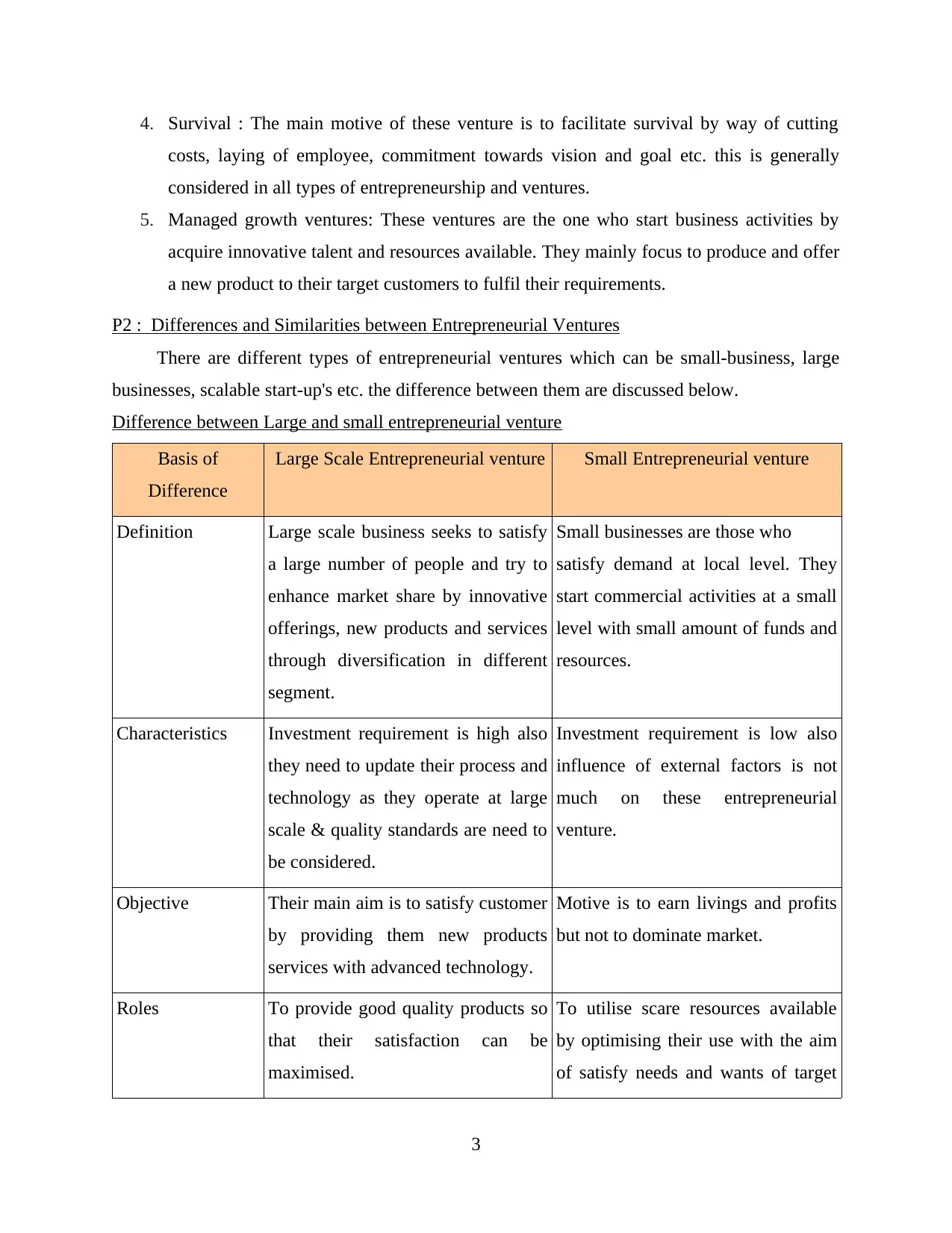
4. Survival : The main motive of these venture is to facilitate survival by way of cutting
costs, laying of employee, commitment towards vision and goal etc. this is generally
considered in all types of entrepreneurship and ventures.
5. Managed growth ventures: These ventures are the one who start business activities by
acquire innovative talent and resources available. They mainly focus to produce and offer
a new product to their target customers to fulfil their requirements.
P2 : Differences and Similarities between Entrepreneurial Ventures
There are different types of entrepreneurial ventures which can be small-business, large
businesses, scalable start-up's etc. the difference between them are discussed below.
Difference between Large and small entrepreneurial venture
Basis of
Difference
Large Scale Entrepreneurial venture Small Entrepreneurial venture
Definition Large scale business seeks to satisfy
a large number of people and try to
enhance market share by innovative
offerings, new products and services
through diversification in different
segment.
Small businesses are those who
satisfy demand at local level. They
start commercial activities at a small
level with small amount of funds and
resources.
Characteristics Investment requirement is high also
they need to update their process and
technology as they operate at large
scale & quality standards are need to
be considered.
Investment requirement is low also
influence of external factors is not
much on these entrepreneurial
venture.
Objective Their main aim is to satisfy customer
by providing them new products
services with advanced technology.
Motive is to earn livings and profits
but not to dominate market.
Roles To provide good quality products so
that their satisfaction can be
maximised.
To utilise scare resources available
by optimising their use with the aim
of satisfy needs and wants of target
3
costs, laying of employee, commitment towards vision and goal etc. this is generally
considered in all types of entrepreneurship and ventures.
5. Managed growth ventures: These ventures are the one who start business activities by
acquire innovative talent and resources available. They mainly focus to produce and offer
a new product to their target customers to fulfil their requirements.
P2 : Differences and Similarities between Entrepreneurial Ventures
There are different types of entrepreneurial ventures which can be small-business, large
businesses, scalable start-up's etc. the difference between them are discussed below.
Difference between Large and small entrepreneurial venture
Basis of
Difference
Large Scale Entrepreneurial venture Small Entrepreneurial venture
Definition Large scale business seeks to satisfy
a large number of people and try to
enhance market share by innovative
offerings, new products and services
through diversification in different
segment.
Small businesses are those who
satisfy demand at local level. They
start commercial activities at a small
level with small amount of funds and
resources.
Characteristics Investment requirement is high also
they need to update their process and
technology as they operate at large
scale & quality standards are need to
be considered.
Investment requirement is low also
influence of external factors is not
much on these entrepreneurial
venture.
Objective Their main aim is to satisfy customer
by providing them new products
services with advanced technology.
Motive is to earn livings and profits
but not to dominate market.
Roles To provide good quality products so
that their satisfaction can be
maximised.
To utilise scare resources available
by optimising their use with the aim
of satisfy needs and wants of target
3
⊘ This is a preview!⊘
Do you want full access?
Subscribe today to unlock all pages.

Trusted by 1+ million students worldwide

customers.
Difference between social and scalable start-up venture
Basis of Difference Social entrepreneurial venture Scalable start-up
entrepreneurial
venture
Definition These ventures run with the
motive of social benefit not for
profit, they work to eradicate
the common problem that
exist.
It is a venture where
entrepreneur believes that their
idea can change the world and
they attract venture capitalist
for investment.
Characteristics They get adequate support
funds and assistance from
government.
They are completely dependent
upon venture capital.
Objective Their main aim is to do
welfare of the society by
implementing innovative
plans, cost effective social
impact etc.
They convince venture
capitalist to invest in their
organisation by explaining
their ideas and opportunities
available.
Roles They play crucial role in
creating awareness about
various issues such as health
and safety, rights, legal
obligations etc.
They takes for innovative idea
and look for business model
which are repeatable and
scalable.
Similarities and differences between public private and social
Particulars Similarities Differences
Private The motive of these kind of
business are to create job
The aim of these organisations
are earning profit.
4
Difference between social and scalable start-up venture
Basis of Difference Social entrepreneurial venture Scalable start-up
entrepreneurial
venture
Definition These ventures run with the
motive of social benefit not for
profit, they work to eradicate
the common problem that
exist.
It is a venture where
entrepreneur believes that their
idea can change the world and
they attract venture capitalist
for investment.
Characteristics They get adequate support
funds and assistance from
government.
They are completely dependent
upon venture capital.
Objective Their main aim is to do
welfare of the society by
implementing innovative
plans, cost effective social
impact etc.
They convince venture
capitalist to invest in their
organisation by explaining
their ideas and opportunities
available.
Roles They play crucial role in
creating awareness about
various issues such as health
and safety, rights, legal
obligations etc.
They takes for innovative idea
and look for business model
which are repeatable and
scalable.
Similarities and differences between public private and social
Particulars Similarities Differences
Private The motive of these kind of
business are to create job
The aim of these organisations
are earning profit.
4
Paraphrase This Document
Need a fresh take? Get an instant paraphrase of this document with our AI Paraphraser
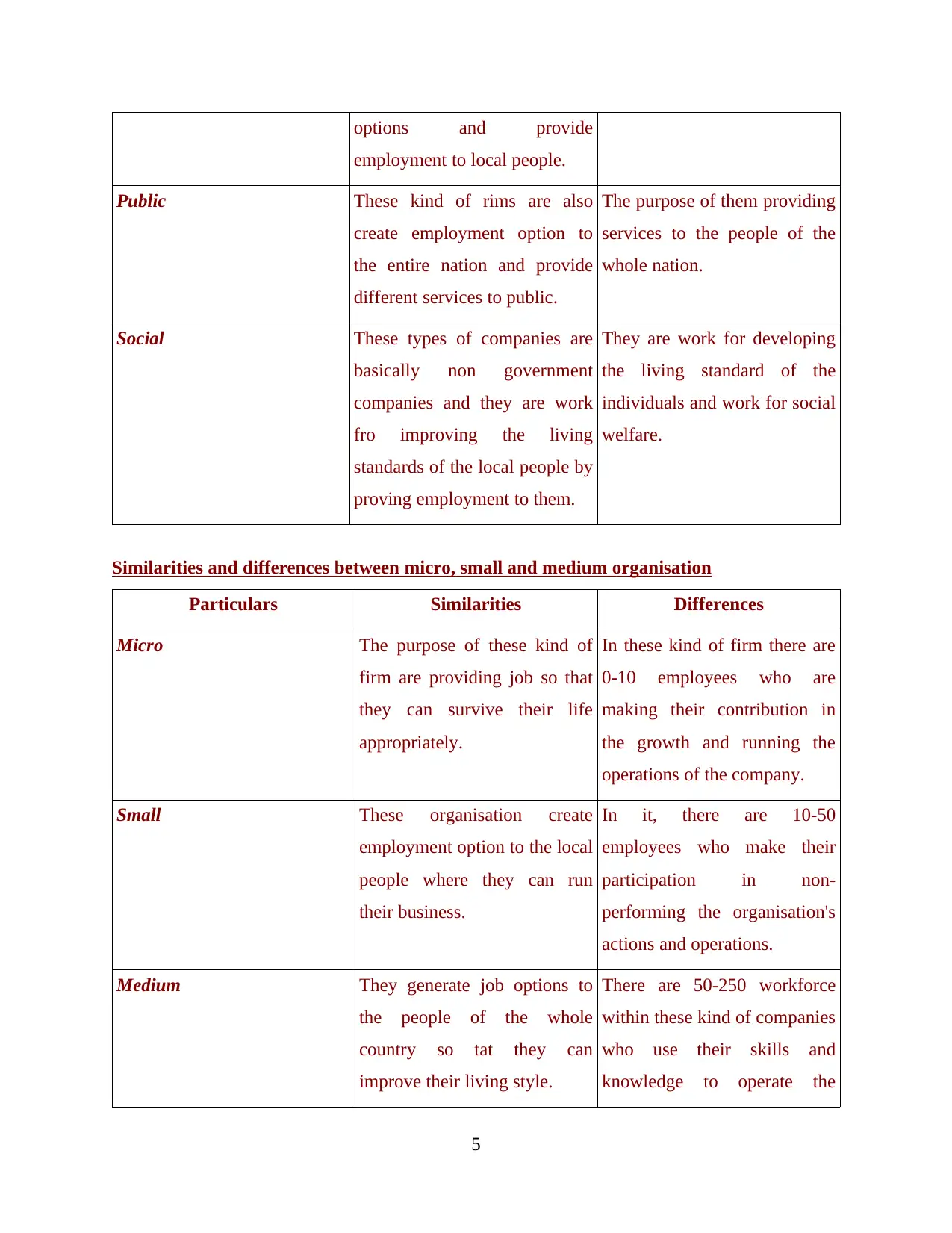
options and provide
employment to local people.
Public These kind of rims are also
create employment option to
the entire nation and provide
different services to public.
The purpose of them providing
services to the people of the
whole nation.
Social These types of companies are
basically non government
companies and they are work
fro improving the living
standards of the local people by
proving employment to them.
They are work for developing
the living standard of the
individuals and work for social
welfare.
Similarities and differences between micro, small and medium organisation
Particulars Similarities Differences
Micro The purpose of these kind of
firm are providing job so that
they can survive their life
appropriately.
In these kind of firm there are
0-10 employees who are
making their contribution in
the growth and running the
operations of the company.
Small These organisation create
employment option to the local
people where they can run
their business.
In it, there are 10-50
employees who make their
participation in non-
performing the organisation's
actions and operations.
Medium They generate job options to
the people of the whole
country so tat they can
improve their living style.
There are 50-250 workforce
within these kind of companies
who use their skills and
knowledge to operate the
5
employment to local people.
Public These kind of rims are also
create employment option to
the entire nation and provide
different services to public.
The purpose of them providing
services to the people of the
whole nation.
Social These types of companies are
basically non government
companies and they are work
fro improving the living
standards of the local people by
proving employment to them.
They are work for developing
the living standard of the
individuals and work for social
welfare.
Similarities and differences between micro, small and medium organisation
Particulars Similarities Differences
Micro The purpose of these kind of
firm are providing job so that
they can survive their life
appropriately.
In these kind of firm there are
0-10 employees who are
making their contribution in
the growth and running the
operations of the company.
Small These organisation create
employment option to the local
people where they can run
their business.
In it, there are 10-50
employees who make their
participation in non-
performing the organisation's
actions and operations.
Medium They generate job options to
the people of the whole
country so tat they can
improve their living style.
There are 50-250 workforce
within these kind of companies
who use their skills and
knowledge to operate the
5
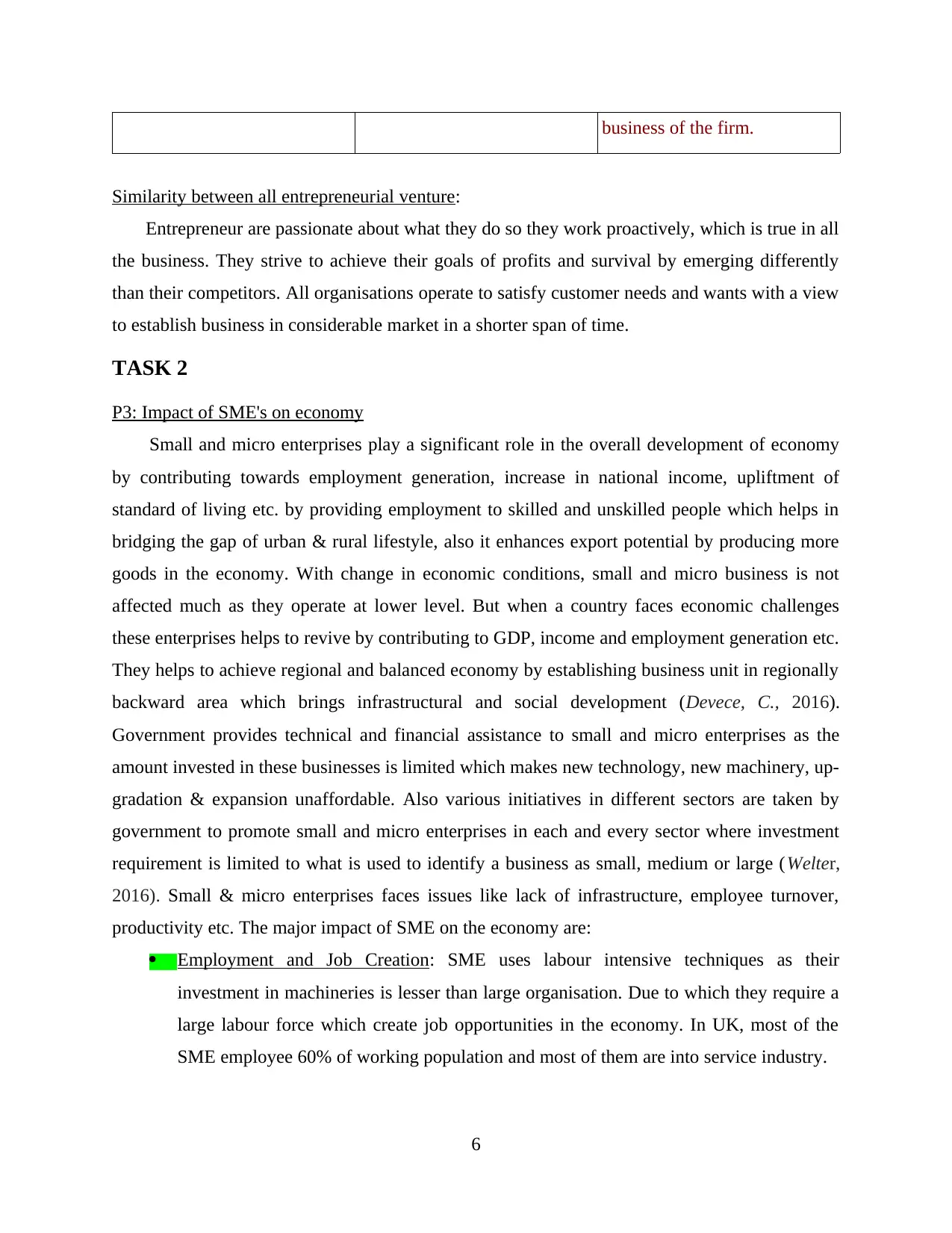
business of the firm.
Similarity between all entrepreneurial venture:
Entrepreneur are passionate about what they do so they work proactively, which is true in all
the business. They strive to achieve their goals of profits and survival by emerging differently
than their competitors. All organisations operate to satisfy customer needs and wants with a view
to establish business in considerable market in a shorter span of time.
TASK 2
P3: Impact of SME's on economy
Small and micro enterprises play a significant role in the overall development of economy
by contributing towards employment generation, increase in national income, upliftment of
standard of living etc. by providing employment to skilled and unskilled people which helps in
bridging the gap of urban & rural lifestyle, also it enhances export potential by producing more
goods in the economy. With change in economic conditions, small and micro business is not
affected much as they operate at lower level. But when a country faces economic challenges
these enterprises helps to revive by contributing to GDP, income and employment generation etc.
They helps to achieve regional and balanced economy by establishing business unit in regionally
backward area which brings infrastructural and social development (Devece, C., 2016).
Government provides technical and financial assistance to small and micro enterprises as the
amount invested in these businesses is limited which makes new technology, new machinery, up-
gradation & expansion unaffordable. Also various initiatives in different sectors are taken by
government to promote small and micro enterprises in each and every sector where investment
requirement is limited to what is used to identify a business as small, medium or large (Welter,
2016). Small & micro enterprises faces issues like lack of infrastructure, employee turnover,
productivity etc. The major impact of SME on the economy are:
Employment and Job Creation: SME uses labour intensive techniques as their
investment in machineries is lesser than large organisation. Due to which they require a
large labour force which create job opportunities in the economy. In UK, most of the
SME employee 60% of working population and most of them are into service industry.
6
Similarity between all entrepreneurial venture:
Entrepreneur are passionate about what they do so they work proactively, which is true in all
the business. They strive to achieve their goals of profits and survival by emerging differently
than their competitors. All organisations operate to satisfy customer needs and wants with a view
to establish business in considerable market in a shorter span of time.
TASK 2
P3: Impact of SME's on economy
Small and micro enterprises play a significant role in the overall development of economy
by contributing towards employment generation, increase in national income, upliftment of
standard of living etc. by providing employment to skilled and unskilled people which helps in
bridging the gap of urban & rural lifestyle, also it enhances export potential by producing more
goods in the economy. With change in economic conditions, small and micro business is not
affected much as they operate at lower level. But when a country faces economic challenges
these enterprises helps to revive by contributing to GDP, income and employment generation etc.
They helps to achieve regional and balanced economy by establishing business unit in regionally
backward area which brings infrastructural and social development (Devece, C., 2016).
Government provides technical and financial assistance to small and micro enterprises as the
amount invested in these businesses is limited which makes new technology, new machinery, up-
gradation & expansion unaffordable. Also various initiatives in different sectors are taken by
government to promote small and micro enterprises in each and every sector where investment
requirement is limited to what is used to identify a business as small, medium or large (Welter,
2016). Small & micro enterprises faces issues like lack of infrastructure, employee turnover,
productivity etc. The major impact of SME on the economy are:
Employment and Job Creation: SME uses labour intensive techniques as their
investment in machineries is lesser than large organisation. Due to which they require a
large labour force which create job opportunities in the economy. In UK, most of the
SME employee 60% of working population and most of them are into service industry.
6
⊘ This is a preview!⊘
Do you want full access?
Subscribe today to unlock all pages.

Trusted by 1+ million students worldwide

Contribution to GDP : SME improves the level of output which adds to the GDP of the
economy. They come up with innovation and new solutions which improves chances of
survival and growth, this makes sources of funds accessible. SME contribution in
turnover is almost half of the economy's turnover.
Taxes and Duties: As these SME has to pay taxes and duties to government, their
expansion improves government earning which can be used by government in social
welfare and infrastructural development (Julien, 2018).
The impact of the small and micro business can be analysed from the given figures :
From this chart this can be analysed that SME are operating in different sectors and
contributing to the employment. Change in number of Small and micro enterprises and their
contribution between 2008-2014 has increased in some sectors like in creative industries,
professional services, digital while in some it has declined as in construction, manufacturing.
This is the how SME contribute in the economy (SME impact in the UK economy, 2019).
P4 : Importance of small businesses and business start-ups to the growth of the social economy
Social economy comprises of those corporations, enterprises, associations, institutions etc.
which have common goal, values and features. They vary from small businesses to large
7
Figure 2: Change in SMEs by sector (UK), 2008-2014
Source: Change in SMEs by sector (UK), 2008-2014
economy. They come up with innovation and new solutions which improves chances of
survival and growth, this makes sources of funds accessible. SME contribution in
turnover is almost half of the economy's turnover.
Taxes and Duties: As these SME has to pay taxes and duties to government, their
expansion improves government earning which can be used by government in social
welfare and infrastructural development (Julien, 2018).
The impact of the small and micro business can be analysed from the given figures :
From this chart this can be analysed that SME are operating in different sectors and
contributing to the employment. Change in number of Small and micro enterprises and their
contribution between 2008-2014 has increased in some sectors like in creative industries,
professional services, digital while in some it has declined as in construction, manufacturing.
This is the how SME contribute in the economy (SME impact in the UK economy, 2019).
P4 : Importance of small businesses and business start-ups to the growth of the social economy
Social economy comprises of those corporations, enterprises, associations, institutions etc.
which have common goal, values and features. They vary from small businesses to large
7
Figure 2: Change in SMEs by sector (UK), 2008-2014
Source: Change in SMEs by sector (UK), 2008-2014
Paraphrase This Document
Need a fresh take? Get an instant paraphrase of this document with our AI Paraphraser
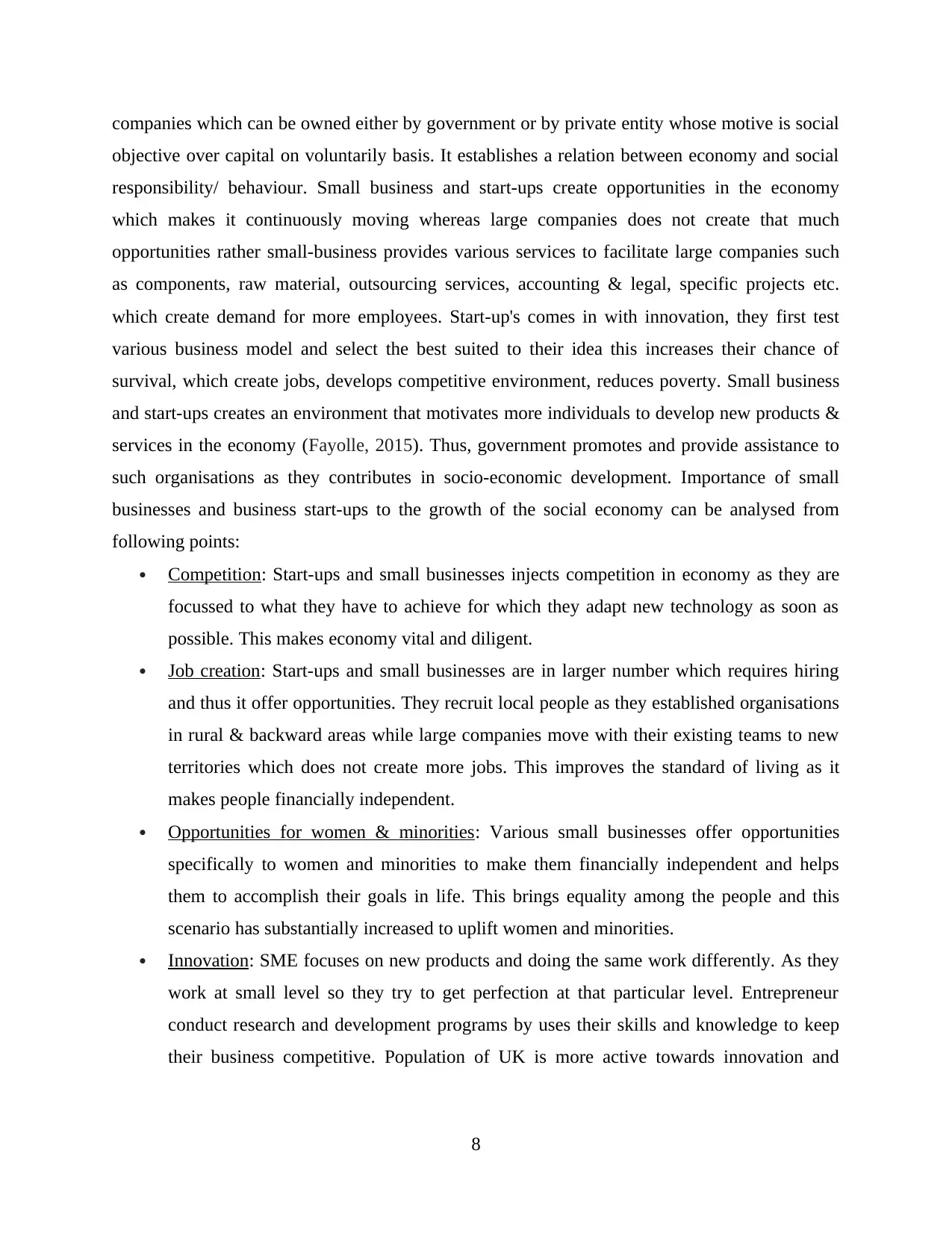
companies which can be owned either by government or by private entity whose motive is social
objective over capital on voluntarily basis. It establishes a relation between economy and social
responsibility/ behaviour. Small business and start-ups create opportunities in the economy
which makes it continuously moving whereas large companies does not create that much
opportunities rather small-business provides various services to facilitate large companies such
as components, raw material, outsourcing services, accounting & legal, specific projects etc.
which create demand for more employees. Start-up's comes in with innovation, they first test
various business model and select the best suited to their idea this increases their chance of
survival, which create jobs, develops competitive environment, reduces poverty. Small business
and start-ups creates an environment that motivates more individuals to develop new products &
services in the economy (Fayolle, 2015). Thus, government promotes and provide assistance to
such organisations as they contributes in socio-economic development. Importance of small
businesses and business start-ups to the growth of the social economy can be analysed from
following points:
Competition: Start-ups and small businesses injects competition in economy as they are
focussed to what they have to achieve for which they adapt new technology as soon as
possible. This makes economy vital and diligent.
Job creation: Start-ups and small businesses are in larger number which requires hiring
and thus it offer opportunities. They recruit local people as they established organisations
in rural & backward areas while large companies move with their existing teams to new
territories which does not create more jobs. This improves the standard of living as it
makes people financially independent.
Opportunities for women & minorities: Various small businesses offer opportunities
specifically to women and minorities to make them financially independent and helps
them to accomplish their goals in life. This brings equality among the people and this
scenario has substantially increased to uplift women and minorities.
Innovation: SME focuses on new products and doing the same work differently. As they
work at small level so they try to get perfection at that particular level. Entrepreneur
conduct research and development programs by uses their skills and knowledge to keep
their business competitive. Population of UK is more active towards innovation and
8
objective over capital on voluntarily basis. It establishes a relation between economy and social
responsibility/ behaviour. Small business and start-ups create opportunities in the economy
which makes it continuously moving whereas large companies does not create that much
opportunities rather small-business provides various services to facilitate large companies such
as components, raw material, outsourcing services, accounting & legal, specific projects etc.
which create demand for more employees. Start-up's comes in with innovation, they first test
various business model and select the best suited to their idea this increases their chance of
survival, which create jobs, develops competitive environment, reduces poverty. Small business
and start-ups creates an environment that motivates more individuals to develop new products &
services in the economy (Fayolle, 2015). Thus, government promotes and provide assistance to
such organisations as they contributes in socio-economic development. Importance of small
businesses and business start-ups to the growth of the social economy can be analysed from
following points:
Competition: Start-ups and small businesses injects competition in economy as they are
focussed to what they have to achieve for which they adapt new technology as soon as
possible. This makes economy vital and diligent.
Job creation: Start-ups and small businesses are in larger number which requires hiring
and thus it offer opportunities. They recruit local people as they established organisations
in rural & backward areas while large companies move with their existing teams to new
territories which does not create more jobs. This improves the standard of living as it
makes people financially independent.
Opportunities for women & minorities: Various small businesses offer opportunities
specifically to women and minorities to make them financially independent and helps
them to accomplish their goals in life. This brings equality among the people and this
scenario has substantially increased to uplift women and minorities.
Innovation: SME focuses on new products and doing the same work differently. As they
work at small level so they try to get perfection at that particular level. Entrepreneur
conduct research and development programs by uses their skills and knowledge to keep
their business competitive. Population of UK is more active towards innovation and
8
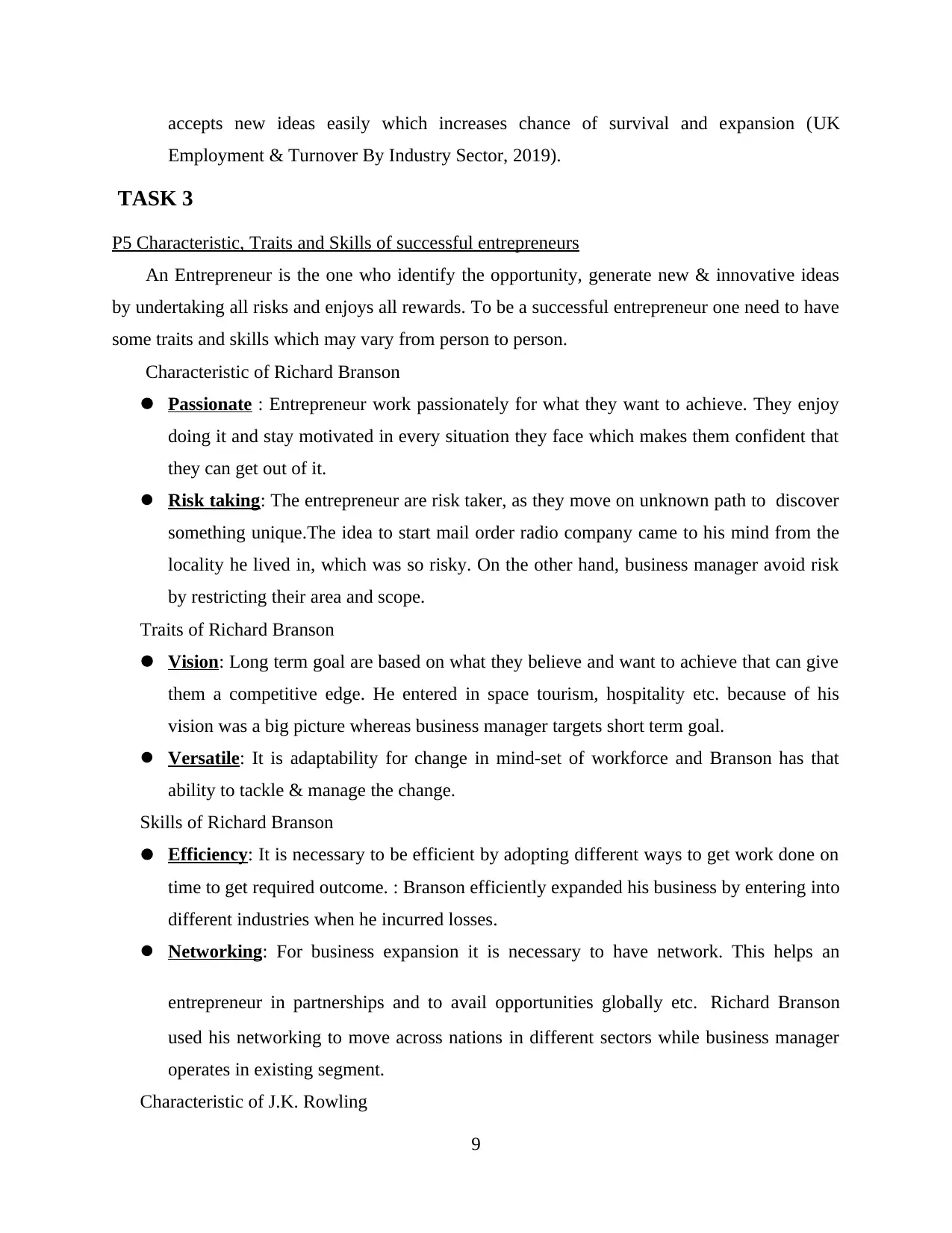
accepts new ideas easily which increases chance of survival and expansion (UK
Employment & Turnover By Industry Sector, 2019).
TASK 3
P5 Characteristic, Traits and Skills of successful entrepreneurs
An Entrepreneur is the one who identify the opportunity, generate new & innovative ideas
by undertaking all risks and enjoys all rewards. To be a successful entrepreneur one need to have
some traits and skills which may vary from person to person.
Characteristic of Richard Branson
Passionate : Entrepreneur work passionately for what they want to achieve. They enjoy
doing it and stay motivated in every situation they face which makes them confident that
they can get out of it.
Risk taking: The entrepreneur are risk taker, as they move on unknown path to discover
something unique.The idea to start mail order radio company came to his mind from the
locality he lived in, which was so risky. On the other hand, business manager avoid risk
by restricting their area and scope.
Traits of Richard Branson
Vision: Long term goal are based on what they believe and want to achieve that can give
them a competitive edge. He entered in space tourism, hospitality etc. because of his
vision was a big picture whereas business manager targets short term goal.
Versatile: It is adaptability for change in mind-set of workforce and Branson has that
ability to tackle & manage the change.
Skills of Richard Branson
Efficiency: It is necessary to be efficient by adopting different ways to get work done on
time to get required outcome. : Branson efficiently expanded his business by entering into
different industries when he incurred losses.
Networking: For business expansion it is necessary to have network. This helps an
entrepreneur in partnerships and to avail opportunities globally etc. Richard Branson
used his networking to move across nations in different sectors while business manager
operates in existing segment.
Characteristic of J.K. Rowling
9
Employment & Turnover By Industry Sector, 2019).
TASK 3
P5 Characteristic, Traits and Skills of successful entrepreneurs
An Entrepreneur is the one who identify the opportunity, generate new & innovative ideas
by undertaking all risks and enjoys all rewards. To be a successful entrepreneur one need to have
some traits and skills which may vary from person to person.
Characteristic of Richard Branson
Passionate : Entrepreneur work passionately for what they want to achieve. They enjoy
doing it and stay motivated in every situation they face which makes them confident that
they can get out of it.
Risk taking: The entrepreneur are risk taker, as they move on unknown path to discover
something unique.The idea to start mail order radio company came to his mind from the
locality he lived in, which was so risky. On the other hand, business manager avoid risk
by restricting their area and scope.
Traits of Richard Branson
Vision: Long term goal are based on what they believe and want to achieve that can give
them a competitive edge. He entered in space tourism, hospitality etc. because of his
vision was a big picture whereas business manager targets short term goal.
Versatile: It is adaptability for change in mind-set of workforce and Branson has that
ability to tackle & manage the change.
Skills of Richard Branson
Efficiency: It is necessary to be efficient by adopting different ways to get work done on
time to get required outcome. : Branson efficiently expanded his business by entering into
different industries when he incurred losses.
Networking: For business expansion it is necessary to have network. This helps an
entrepreneur in partnerships and to avail opportunities globally etc. Richard Branson
used his networking to move across nations in different sectors while business manager
operates in existing segment.
Characteristic of J.K. Rowling
9
⊘ This is a preview!⊘
Do you want full access?
Subscribe today to unlock all pages.

Trusted by 1+ million students worldwide
1 out of 17
Related Documents
Your All-in-One AI-Powered Toolkit for Academic Success.
+13062052269
info@desklib.com
Available 24*7 on WhatsApp / Email
![[object Object]](/_next/static/media/star-bottom.7253800d.svg)
Unlock your academic potential
Copyright © 2020–2026 A2Z Services. All Rights Reserved. Developed and managed by ZUCOL.





